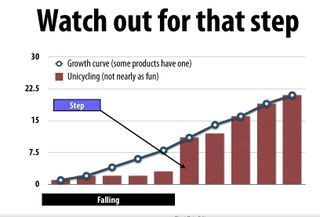Seth Godin's Blog, page 325
July 27, 2009
Four videos about noise, social and decency
Here are four new videos from the Tom Peters Amex/Open session I did last year. Enjoy. (If you want to, you can press all four at once and it will sound like a UN debate)...








July 26, 2009
The reason riding a unicycle is difficult
All the time you're practicing, you aren't actually riding. You're falling. Then, if you don't give up after all this failure, in a blink, you're riding. No in-between. Failing...riding.
Learning things that are binary like this is quite difficult. They are difficult to market because people don't like to fail. They're difficult to master because people don't like to fall. "You don't get it, but you will," is a hard sell.
Here's a great parenting tip: the best way to te
July 25, 2009
Am I the only one distracted by apostrophes and weird "quoting"?
When I get a manuscript or see a sign that misuses its and it's and quotes, I immediately assume that the person who created it is stupid.
I understand that this is a mistake on my part. They're not necessarily totally stupid, they're just stupid about apostrophes.
It's a moral failing on my part to conflate the two, but I bet I'm not the only one. What else are your customers judging you on?
It's not just about being a grammar stickler. The fact is, we're constantly looking for clues and telling o
July 24, 2009
Social norms
The math for handshakes is difficult. You have to stand, look, squeeze, time and end in just the right way or it's weird. Skip the handshake or do a six-second version and people look at you funny.
Interpersonal relations have had thousands of years to develop. Online, there's been no time.
There are people who tweet in a way that rubs you the wrong way. Marketers who build businesses that seem scammy to you, or build websites that feel wrong. I get plenty of email from people that just doesn't fe
July 23, 2009
Welcome to island marketing
If you run a business on a small island, every interaction matters and every customer is precious.
There's a finite number of people you're going to be able to sell to, and every person you interact with knows everyone else, so you always have to be on your best behavior. You can't say, "tough" and then go on to the next person. You can't run ads that churn and burn through an endless supply of naive prospects. You only get one chance to make a first impression, and on the island, that impression
July 22, 2009
When you buy Zappos, what do you buy?
Amazon just announced that they're spending $800,000,000.00 (looks better that way) to buy Zappos.com.
But wait.
Amazon already has plenty of shoes.
Amazon already has great technology.
Amazon already has relationships with Fedex and UPS.
What you buy when you spend that kind of money is what matters now. And what matters is:
A corporate culture that's not the same (and where great people choose to work)
A tight relationship with customers that give you permission to talk with them
A business mode
Ishita's here
 Please welcome Ishita Gupta, who now doubles the size of the team here at my tiny version of a company.
Please welcome Ishita Gupta, who now doubles the size of the team here at my tiny version of a company.
Ishita is our newly appointed Head of Hoopla. She's working with me on strategy, new projects, digital detailing, publishing and coordination. She's one of the most generous, most connected people I've ever had the chance to meet, and I'm lucky to be able to work with her.
If my name is on it, it's still from me... every word is still mine, every email too. Ishita is going to agitate, cajole an
Death spiral!
You've probably seen it. The fish monger sees a decline in business, so they have less money to spend on upkeep and inventory, so they keep the fish a bit longer and don't clean up as often, so of course, business declines and then they have even less money... Eventually, you have an empty, smelly fish store that's out of business.
The doctor has fewer patients so he doesn't invest as much in training or staff and so some other patients choose to leave which means that there are even fewer patien
July 21, 2009
Winning on the uphills
Interesting business lesson learned on a bicycle: it's very difficult to improve your performance on the downhills.
I used to dread the uphill parts of my ride. On a recumbent bike, they're particularly difficult. So I'd slog through, barely surviving, looking forward to the superspeedy downhill parts.
Unfortunately, I had a serious accident a few years ago (saving the life of a clueless pedestrian by throwing myself onto the pavement). Downhill might be fast, but it's crazy.
Lesson learned. Now
July 20, 2009
He's doing his best
In fact, everyone is always doing their best under the circumstances. As my friend Al says, there's no such thing as irrational behavior. That's because in this moment, given the perceptions someone is holding, the way they behave is in fact the only way they can behave.
Consumers don't make choices as much as they react and respond to the inputs and assumptions they have about the marketplace, their life and your brand.
If you don't like the way someone is acting, understand you can't change his
Seth Godin's Blog
- Seth Godin's profile
- 6546 followers




